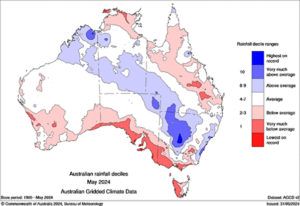20 June 2024
Recent data from the Bureau of Meteorology shows that many grapegrowing regions experienced below average or very much below average rainfall in May 2024. The medium-range forecast through to September is for similar weather conditions to continue in many regions. Research by the South Australian Research and Development Institute (SARDI) indicates that if dry winter conditions are not managed proactively, grapevine yield can be negatively impacted by between 20 and 40% in the coming season.

Figure 1. Map of Australia showing areas in red that received below average rainfall in May 2024. Image courtesy of Bureau of Meteorology.
If possible, apply irrigation during winter
To prevent yield losses due to a winter drought, best practice advice is to apply irrigation during dry winter months to maintain soil moisture. Irrigate with enough water to achieve field capacity in the rootzone. It is important to apply this irrigation now and not wait until budburst to fill the profile, as water applied at budburst after a dry winter stimulates canopy growth at the expense of fruit. If dry conditions are maintained into spring, then irrigation needs to continue to support canopy and crop growth. Growers can ensure water is maintained in the soil profile, especially until flowering, by monitoring rainfall and soil moisture sensors.
If only limited irrigation water is available
If the soil profile is dry and only limited water is available (e.g. from an on-farm dam), then the use of this water needs to be carefully budgeted. Blocks with a better financial return should be prioritised over blocks where the value of the fruit is likely to be lower. A small canopy will use less water, so spring irrigation should be avoided until canopy growth has stopped.
Other useful resources
- Maps of rainfall patterns from the Bureau of Meteorology
- Keep up the water during winter (Wine Australia article June 2019)
- AWRI climate and weather tools webpage
For more information or assistance with managing dry winter conditions, please contact the AWRI helpdesk on 08 8313 6600 or helpdesk@awri.com.au.
Acknowledgements
The AWRI’s eBulletin is supported by Wine Australia, with levies from Australia’s grapegrowers and winemakers and matching funds from the Australian Government. The AWRI is a member of the Wine Innovation Cluster in Adelaide, South Australia. Dr Paul Petrie (SARDI) is thanked for his contribution.

